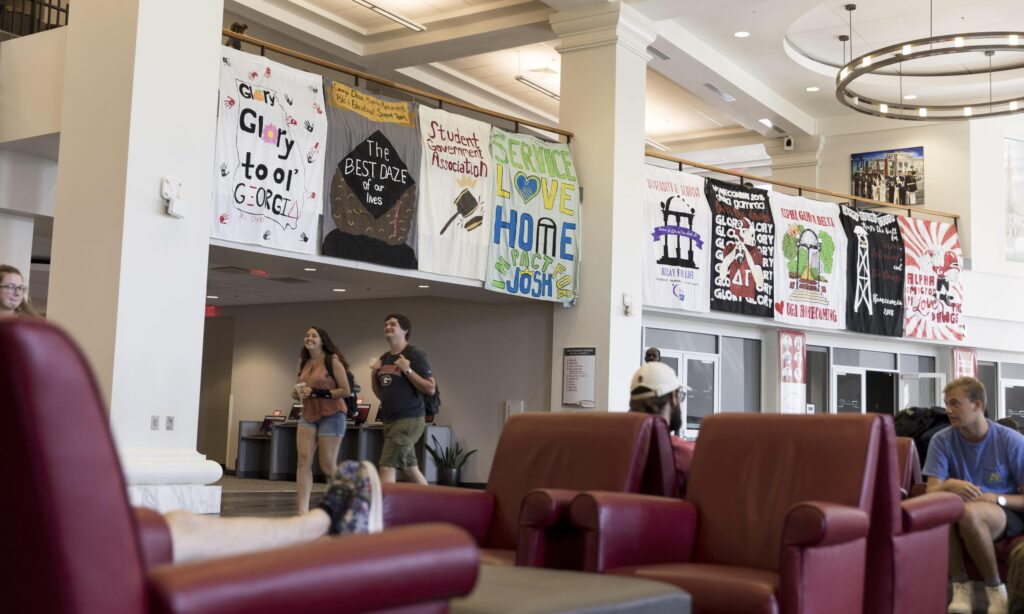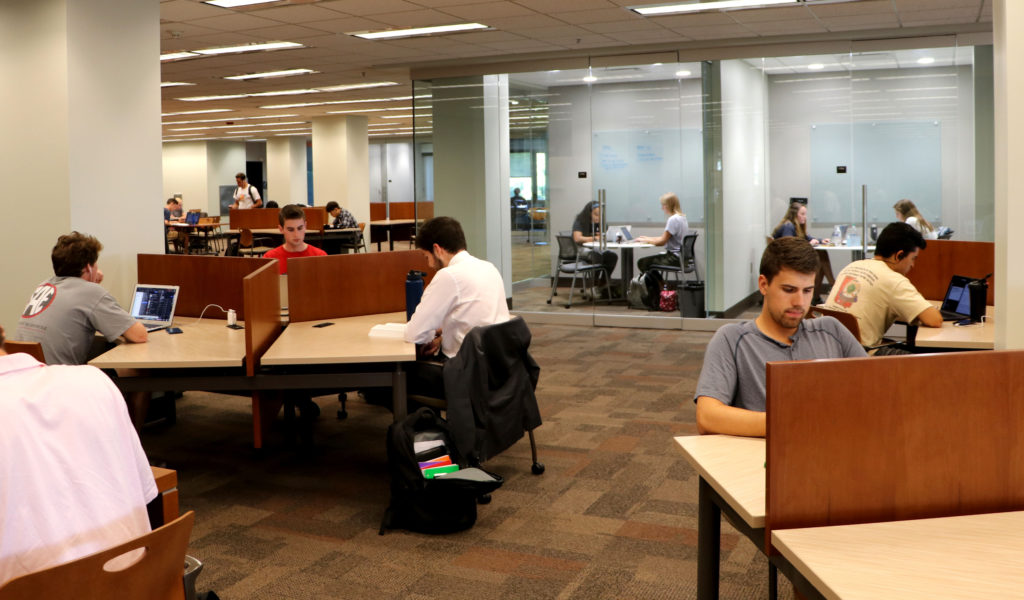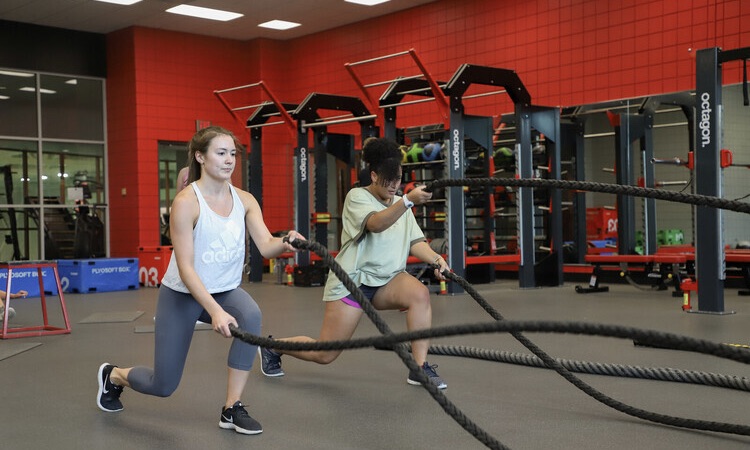TRANSITION GUIDE
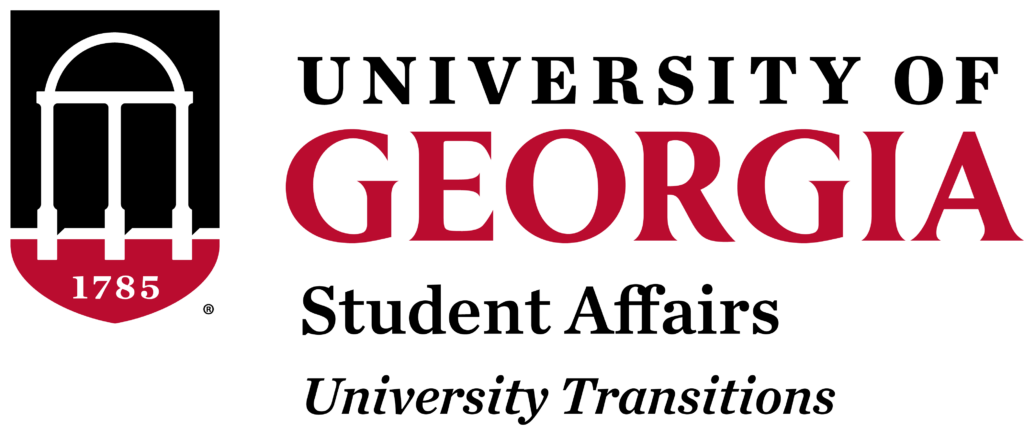
- Speaking UGA
- UGA Alphabet Soup
- The UGA Mobile App
- Helpful Tips for Navigating Campus
- When Is It Open? · Facility Hours
- Get Connected: Technology at UGA
- Home Is Where the Arch Is: University Housing
- Off-Campus Housing Marketplace
- Office of Student Financial Aid
- Preparing for the FDOC (First Day of Classes)
- Welcome UGA
GET STARTED
In This Section
Speaking UGA
When you first arrive on campus, you’ll hear people using some terms in which you may not be familiar with. Here are some of the common terms used at UGA.
Academic Calendar – The academic calendar is a list of important dates for the school year and includes Fall, Spring and Summer semester dates. Here is where you will find drop/add dates, holidays and breaks, withdrawal deadlines, reading day and exam dates.
Academic Status – This is the status of a student with respect to academic performance. A student may be in Good Standing with a cumulative average of 2.0 or higher, on Scholastic Probation with a cumulative average below a 2.0, on Continued Probation if you remain on probation for more than one semester, or Dismissed after several semesters on probation. Your advisor can explain the nuances of academic status.
Athena – UGA’s course registration system. Students will find class schedules and other important information in Athena. Advisors use Athena to clear students’ advising holds so they can register.
UGA Bulletin – The UGA Bulletin is an online catalog that describes every major, minor and certificate program offered, outlines all the requirements for the degree or program and describes each course.
Certificate Program – Certificate programs are generally multidisciplinary programs of approximately 15 hours designed to give students specific skills in an area of interest. Some examples include Digital Humanities, Historic Preservation and Organic Agriculture. You will find a complete list of Certificate Programs in the Bulletin.
Clear Holds – Holds that keep you from registering for classes can be placed on your account for a variety of reasons including unpaid fees, parking tickets or student conduct infractions. Every student at UGA has an advising hold every semester, until the student meets with his advisor. Once the student is advised, the advisor clears the hold and the student will be able to register when his time ticket comes up. Holds placed by other offices, such as Parking Services, must be cleared through the office that places them.
Core – The first 60 hours of your degree requirements are in the core and are sometimes referred to as General Education requirements, a designated group of foundation courses in six disciplinary areas. The Core is intended to provide the broad based liberal arts education critical to career success, improving writing and quantitative skills and encouraging global citizenship.
Course Load – The total number of courses/credit hours the student is enrolled in per term.
Dean’s List – An honor reserved for students who earn a 3.5 GPA or higher on 14 or more credit hours in a semester.
DegreeWorks – Degree Works is the online degree audit system used by UGA to record a student’s progress in satisfying degree requirements. Students can see their degree audit by logging into DegreeWorks with their MyID and password.
Drop/Add – The period of time at the beginning of each semester when students can change the courses they registered for without incurring a penalty. At UGA, Drop/Add takes place in the first week of classes. Students should always talk to their advisor before dropping or adding classes.
Event Pass – A digital ticket that can be used at any event listed in the Involvement Network. It can be stored in Apple Wallet, Samsung Pay, saved to your photo library, or printed. Download it one time, and you can use it at all events. It’s that easy!
Experiential Learning – Experiential learning gives students hands‐on opportunities to connect their academic foundations to the world beyond the classroom through creative endeavors, study abroad and field schools, internship and leadership opportunities, faculty‐ mentored research, and service‐learning. All UGA students are required to engage in at least one experiential learning activity. Your advisor will help you decide what is best for you.
FAFSA – This acronym stands for Free Application for Federal Student Aid, and is the basic form you must fill out to receive financial aid from the federal government to pay for college. The Financial Aid Office at UGA can help you with this process.
Hardship Withdrawal – When a student experiences a medical, financial or family crisis that seriously affects the student’s academic performance, they may seek a hardship withdrawal and be removed from all classes for the semester without penalty to their grades. Hardship withdrawals require documentation of a problem and can be sought through the Office of Student Care and Outreach.
High-Demand Major – a major that receives or expects to receive more applications for the major from fully qualified rising juniors than the program can accommodate without hindering the quality of instruction offered. For this reason, high demand majors generally have entrance requirements that must be satisfied by the student applying to the major. Students should be aware that many of these majors are highly competitive.
Involvement Network – a powerful platform that connects students with various student organizations, clubs, and events. It serves as a central hub for students to explore and engage in extracurricular activities, leadership opportunities, and community service.
Lower Division – Courses numbered in the 1000 and 2000 range, usually taken by first and second year students.
Minor – A minor is a secondary field of study that requires fewer hours. Students do not earn a degree in their minor, but it is noted on their transcript.
MyID – At UGA, every student and employee has a MyID that is used with a password to access email and use other computer programs and sites at the University. Your MyID is usually the first part of your University email address.
Office Hours – The time set aside by professors and instructors to meet with their students and answer questions. Office hours are usually at a set time every week. You can usually find a professor’s office hours on his syllabus.
Overall Average – The average of grades in every college level course the student has taken regardless of institution. For transfer students, the overall average includes classes taken at their former and current institutions.
Presidential Scholar – An honor reserved for students who earn a 4.0 grade point average on 14 or more credit hours in a semester.
SAGE – Our Student Advisement and Guidance Expert (SAGE) is an advising platform that allows advisors to keep notes about their students’ interests and plans. It is used in all colleges at the University of Georgia, so the student’s academic record travels with him from one major to another. Students make their advising appointments by logging into SAGE and selecting an appointment on the advisor’s calendar.
Snellibrate – Going to Snelling Dining Hall after midnight.
Syllabus – An outline of the professor’s plans for the course that includes assignments, exam dates and projects. The syllabus also includes the learning objectives for the course and class policies like attendance. It is very important to read the syllabus carefully at the beginning of the semester. The syllabus outlines the expectations and requirements of the course.
Upper Division – Courses in the 3000 and 4000 range, usually taken by juniors and seniors to fulfill degree requirements in their major or minor.
Withdrawal – The student’s decision to remove themselves from a class after the drop/add period is over. If the student withdraws prior to the withdrawal deadline, they receive a W on their transcript. If the student withdraws after the deadline (usually soon after the semester midpoint), they will receive a WF on their transcript. A W has no effect on GPA, but a WF grade will factor into the student’s GPA as an F.
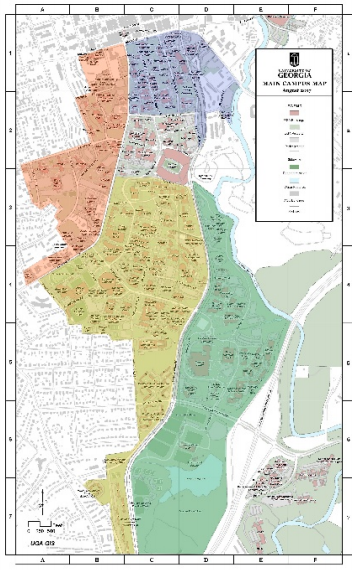
UGA Campus
Historic North Campus houses many humanities and social science departments in Franklin, as well as UGA Administration, the UGA Chapel & Main Library. It is bordered by Broad St. and the Arch to the north.
South Campus is the home of science and computational departments and professional schools in related fields and the Stegeman Coliseum.
East Campus, off East Campus Road is where you’ll find Ramsey Recreation Center, Parking Services, University Health Services (often simply referred to as the Health Center), Franklin’s Music and Art programs, as well as the Performing Arts Center, Georgia Museum of Arts, East Campus Village residence and dining halls.
West Campus, on the west side of Lumpkin St. includes the high rise residence halls, the Terry College complex, the Special Collections Library and various chapels and organizations.
Health Sciences, located at the former Navy School on Prince Avenue houses the Augusta University/University of Georgia Medical Partnership. It is not visible on the map.
Learn more UGA lingo here.
UGA Alphabet Soup
CAPS Counseling and Psychiatric Services, mental health and well‐being services for students, located in the Student Health Center
CAES College of Agriculture and Environmental Design
COE College of Education, located in Aderhold Hall
CSE Cultural Student Engagement
CURO Center for Undergraduate Research Opportunities
A&T Accessibility & Testing strives to promote a welcoming academic, physical, and social environment for students with disabilities at UGA and provides centralized testing and evaluation services for all students, faculty, and the surrounding community
ECV East Campus Village
EL Experiential Learning requirement to engage in hands‐on, experiential learning within a domestic or global setting.
eLC eLearning Commons, the online learning management system used by professors and instructors to record assignments, grades, post readings and discussions for their class.
ELS Engagement, Leadership & Service
FACS College of Family and Consumer Sciences, located in Dawson Hall
GA Graduate Assistant, a graduate student who assists a professor in teaching a class, a lab or in research.
GLO Greek Life Office
GSE Global Student Engagement
IM Fields Intramural Fields – located off College Station Road
MLC The Miller Learning Center, a center set aside specifically for student learning use with defined study spaces, computer labs and small group meeting rooms, next door to the Tate Center.
OSSA The Office for Student Success and Achievement, found in Milledge Hall, is the central location for free academic coaching, tutoring and other student success initiatives
OVPSA Office of the Vice President for Student Affairs
PJs Psychology/Journalism buildings
RSVP The Relationship and Sexual Violence Prevention Center provides information, advocacy and support for victims of sexual violence.
SCO Student Care & Outreach
SGA Student Government Association
SLC The Science Learning Center, a modern, efficient and flexible space for undergraduate laboratory teaching in the STEM (science, technology, engineering and math) disciplines, located on south campus.
SPIA School of Public and International Affairs.
UHS University Health Center
The UGA Mobile App
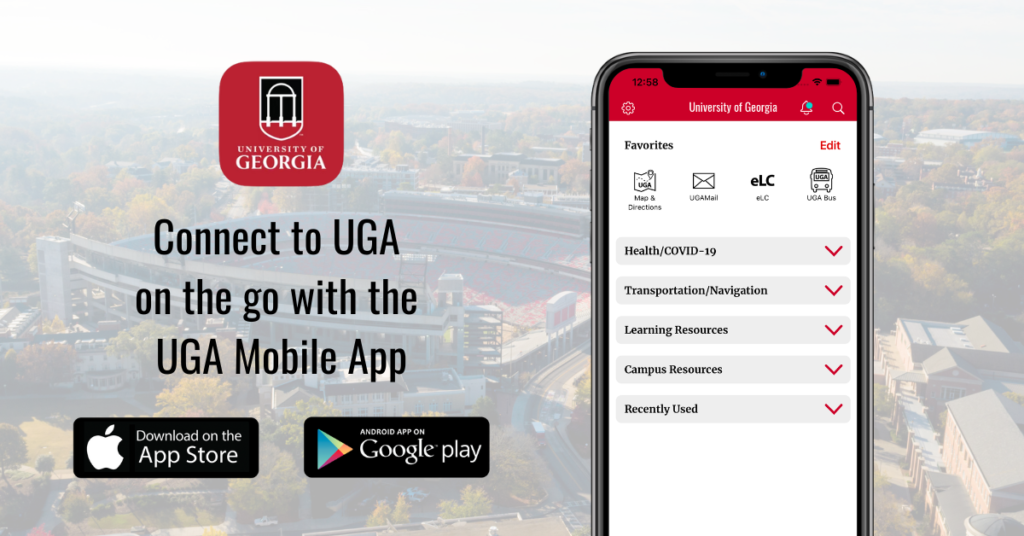
The UGA Mobile App is the best of the Bulldog Nation in one central mobile app for students, visitors, parents, faculty, staff and fans. It’s the official mobile app of the University of Georgia. Download the app for free on Google Play and the App Store.
App Highlights
- Bus trackers for UGA Campus Transit and Athens Transit
- Campus map + directions
- Easy access to learning and campus resources
- Ability to check parking deck occupancy and campus parking lot enforcement hours
- Ability to check dining hall occupancy
Helpful Tips for Navigating Campus
As pedestrian, cyclist, and motorist traffic begins to increase on campus, we encourage you to take advantage of the following resources:
Walking
- Use the Campus Map to find routes – the UGA app includes a Campus Map feature that helps you quickly find point-to-point walking routes.
- Check out these walking safety tips from Watch for the Dawgs.
- Walking will often be a quicker transit option than you might think. It’s also a great way to see all that UGA’S beautiful campus has to offer!
Biking
- Learn how to be a smart cyclist by checking out these bike riding tips from Watch for the Dawgs.
- There are numerous bike lanes or paths to get you anywhere you need to go on campus.
- Bikers are not required to have a permit to park or ride a bike on campus
- There are bike racks on all of the UGA buses. Learn how to use the bus bike racks here.
- Find bike racks with ease – UGA is a bike friendly campus and has been named a Bronze Bicycle Friendly University by the League of American Bicyclists. Athens-Clarke County is also a recognized Bicycle Friendly Community and has several bike lanes and marked shared roads. You can find bike rack locations with the UGA app.
- Keep your bicycle secure by checking out these bicycle security tips from Watch for the Dawgs.
- Visit the on-campus Fix-It Stations – UGA offers four Fixit self-service bike repair stations on campus equipped with a tire pump and basic tools. Located at the Miller Learning Center, the Ramsey Center, the Main Library, and Myers Quad, these stations also include QR codes that link to repair instructions.
- Every fall before Thanksgiving break, Bike Athens will offer free bicycle safety inspections and tune-ups during the Operation Safe Drive event.
E-Scooters & Micromobility
- Some students use electric scooters, skateboards, hoverboards, and one-wheels as a convenient, efficient, and affordable means for getting around campus.
- It is important to note that there has been an increase of accidents that occur when riders fail to operate these devices in a safe manner. Watch for the Dawgs has put together some important safety information that students should review prior to utilizing these devices.
UGA Campus Transit
- Familiarize yourself with bus routes – familiarize yourself with bus stops and route names by viewing routes online and looking at the interactive route map.
Live track the buses – use the UGA app to live track the buses and their routes as well as views of our bus stops.
Athens Transit
- Anyone with a valid UGA ID can ride Athens Transit for free.
- Download the myStop Mobile App on Google Play or the App Store for real-time bus information and trip planning at your fingertips.
Driving
- Use Deck Check to see available parking – Deck Check, available on the UGA app, allows you to see how many parking spots are available in select lots. Use this to make the best choice as to how to travel to or around campus. If all the spots are full, using the bus, carpooling, walking or biking may be a better option.
- Don’t get a parking ticket! Visit the Transportation & Parking Services website or use the UGA App to check campus parking lot enforcement hours. PRO TIP: You can park for free after 5 pm in most UGA lots even if you don’t have a parking permit – just make sure you register your vehicle with Parking Services.
- Download the ParkMobile app for hourly parking – if you plan to park in an hourly parking lot, go ahead and download the ParkMobile app for fast, convenient, and contactless payments. To pay for hourly parking using the app, simply enter the zone number posted on signs in the lot, select the amount of time needed and touch the “Start Parking” button to begin the session. You can extend the time of your parking session on your mobile device, without having to go back to the pay station and receive a push notification when your time is nearing expiration. View a full list of ParkMobile locations on campus here.
- Free motorist assistance is available for parking permit holders and guests from 8:00 a.m. to 5:00 p.m. on weekdays courtesy of UGA Transportation and Parking Services. Services include jump-starts, search (if you forget where you parked), lights-on notices, and assistance/directions for campus events. Call 706-542-PARK (7275) for help.
- Every fall before Thanksgiving break, Transportation and Parking Services hosts Operation Safe Drive where you can get your vehicle inspected before you travel for break.
UGA Ride Smart
- UGA Ride Smart, in partnership with Lyft, offers students discounted rides through a nightly rideshare program that runs from 6:00 p.m. to 6:00 a.m. seven days a week. Rides are offered to or from any destination throughout the greater Athens-Clarke County community as long as the transportation originates or ends within the designated service area, which includes the main UGA campus, Health Sciences Campus, Veterinary complex, and one block north of the Arch in downtown Athens. Learn more at tps.uga.edu/ridesmart/.
Staying Safe on Campus
- Watch for Dawgs, a campus-wide initiative, focuses on providing safety information for those who bike, drive, walk, and bus around UGA. Visit their website as a resource for bicycle, pedestrian, and vehicle safety tips, general information and more!
- Campus Safety Ambassadors (CSAs) are on duty from 7:00 pm to 3:00 am, each day of the week. Although they are not police officers, they do work directly for the police department to provide an additional security presence, act as “eyes and ears” for other police department personnel, and give walking escorts to students on campus. A Campus Safety Ambassador can be requested by calling the UGA Police Department at (706) 542-2200 or through the UGA Safe app.
- The UGASafe app is the University’s new mobile safety app that offers important emergency information and resources. UGASafe features easy phone links to contact the UGA Police and Athens-Clarke County Police, a Mobile BlueLight system, emergency resources, a Friend Walk feature, and more. Learn more about the UGASafe app here. Download for free on Google Play and the App Store.
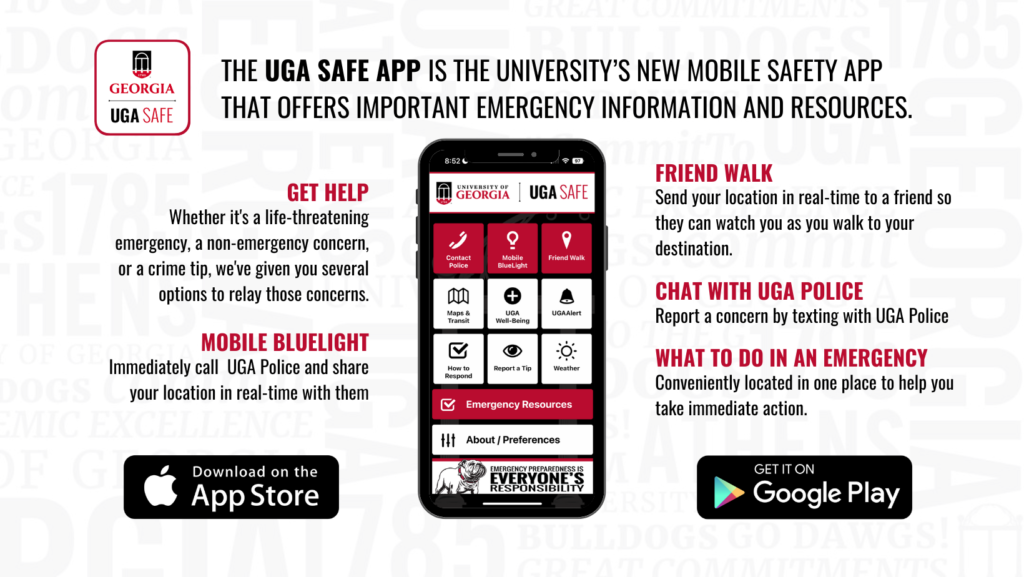
When Is It Open? · Facility Hours
Below are some of the places on campus where students tend to go when they are not in class. Click the buttons below to view the hours of operation for each location.
Get Connected: Technology at UGA
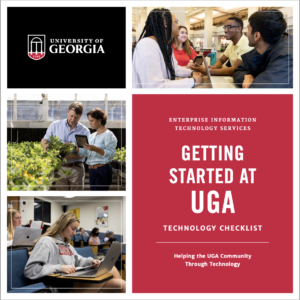
UGA Enterprise Information and Technology Services (EITS) is the central information technology organization for students, faculty and staff at the University of Georgia. They provide support for campus-wide technology services.
- Review the Getting Started at UGA: Technology Checklist to help you get acclimated with common technology that is used at UGA.
- UGA students can install Microsoft Office 365 ProPlus for FREE on up to 10 devices.
- UGA students, faculty, and staff have access to Google Workspace within the uga.edu domain.
Home Is Where the Arch Is: University Housing
University Housing provides comfortable, affordable, and secure on-campus housing options in residential communities where the academic success and personal growth of residents are encouraged and supported.
Off-Campus Housing Marketplace
University Transitions has partnered with CollegePads and StarRez to offer the UGA Off-Campus Housing Marketplace. Visit the website to view listings and resources.
Office of Student Financial Aid (OSFA)
The Office of Student Financial Aid takes a proactive role in supporting the success of a large and diverse student population while complying with all federal, state, and university policies and regulations. Prospective and current students are provided with the information, resources, and services needed to secure funds to finance their education, providing access to, and success in their higher education.
Preparing for the FDOC (First Day of Classes)
To-Do List
- Know where important locations are on campus. UGA is a huge campus, so you’ll want to familiarize yourself with the areas you will visit frequently. You will definitely want to take some time to walk around campus and locate where your classes will be held. This will reduce the stress of having to find them on the first day especially if you have an 8 am or back-to-back classes. You will also want to make sure you know where other popular spots on campus are including (but certainly not limited to) the Tate Student Center, the Miller Learning Center (MLC), the 5 dining halls, the Ramsey Student Center, and the Main Library.
Get your apartment or residence hall room organized. As a new UGA student, you may be starting a new living situation, like an apartment or residence hall. Thus, you will want to be all unpacked and have everything unpacked before classes start. Once school starts, things may get busy with classes and activities so you do not want to have to worry about unpacking on top of that.
- Make a plan for getting school supplies and textbooks. School supplies like pens and paper are college necessities, so you may want to get them before classes start. This will cut down on what you need to pick up after the first day of class. As far as textbooks and other special supplies such as calculators go, your professor may provide you with a list prior to the first day of class or you may be able to find them on the UGA Bookstore’s website. You will most likely find out exactly what you need during the first day of class so you may wish to wait and buy books then.
- Start getting yourself in a routine. Even though you might prefer to sleep late for as many days as possible, if you start getting up at the time you’ll need to for class and start adjusting to your new routine, it could make it easier to get in the swing of things once school has really started. Planning your routine could also include figuring out hold long it will take you to get to classes or when there are breaks you can use to get your homework done. Use a digital or print planner to help you outline your routine so you will be more likely to stick to it!
- Explore Athens! Beyond knowing about places on campus, there are plenty of important places to locate off campus – the nearest gas station, grocery store, your bank branch, or even some good places to eat or grab coffee. Athens is well known for its local restaurants and coffee shops. There are also several nice parks, trails, and green spaces to explore.
- Go over your class schedule. You can find your detailed class schedule on Athena. You will want to make sure your schedule includes all of the classes that it is supposed to and that there is nothing there that doesn’t make sense. You’ll then want to be sure you know when and where each class is held and verify you know how to get to your classes. By looking at your schedule ahead of time, you’ll avoid any surprises during the first week of classes and will have more time to fix potential problems.
Think about your desired college experience. What do you want to experience this academic year as a UGA student? By answering this question, you can start creating goals for the new year and begin figuring out how to make it all happen. You may begin thinking about getting involved on campus, getting a part-time job, or getting research experience.
- Before the FDOC… get a good night’s sleep. The First Day of Class is a big day, and being well rested is a great way to make sure you’re alert and ready to learn. Before going to bed, make sure your alarm is set with plenty of time to get you ready for your big day.
Welcome UGA

Welcome UGA is a campus wide effort to celebrate and embrace incoming and returning students to campus at the, providing opportunities for students to meet each other, engage with resources, and grow their UGA pride.
The great thing about Welcome UGA is that there are opportunities that range in size, location, and focus—you are sure to find something that interests you!
There are Welcome UGA events almost every day during the first six weeks of classes, they’re free (with a valid UGA ID), and they’re an awesome way to meet new UGA students and build connections on campus.
In This Section
• UGA Alphabet Soup
• The UGA Mobile App
• Helpful Tips for Navigating Campus
• When Is It Open? · Facility Hours
• Get Connected: Technology at UGA
• Home Is Where the Arch Is: University Housing
• Off-Campus Housing Marketplace
• Office of Student Financial Aid
• Preparing for the FDOC (First Day of Classes)
• Welcome UGA

